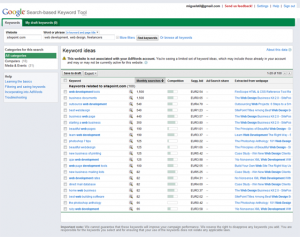 Before learning to write compelling SEO copy you have to know how to select the right keywords. The right keywords are not always what you want them to be – a number of factors like search volumes, popularity, timing, niche and others influence what SEO experts call “keyword research.” To perform good research you need the right tools, and fortunately some very good ones are available for free. What these provide is adequate for even the top SEO professionals. Today I’m giving you a list of tools to use in your future keyword researches, and a few tips to know before you start working.
Before learning to write compelling SEO copy you have to know how to select the right keywords. The right keywords are not always what you want them to be – a number of factors like search volumes, popularity, timing, niche and others influence what SEO experts call “keyword research.” To perform good research you need the right tools, and fortunately some very good ones are available for free. What these provide is adequate for even the top SEO professionals. Today I’m giving you a list of tools to use in your future keyword researches, and a few tips to know before you start working.
Forget about keyword density – this is not what determines your site’s position in the SERPs anymore. Keyword density is too easy to game. Instead of focusing on numbers try focusing on:
- quality and value for the readers – if what you write is not what people want to read, keywords will make no difference
- content harmony – many writers tend to repeat keywords too often, trying to convince the search engines to “rank” their sites for those specific terms. The technique is called keyword stuffing, and the effects are negative: exasperated readers, low rankings in the SERPs. The solution: less is more. Keep keyword density under 3%
- relevance for what you are trying to present in front of your readers – don’t write about shoes when you sell boots. Both are footwear right, but the customers who want to buy shoes will feel mislead and frustrated to have entered the wrong store. Do not mislead your readers for the sake of SE rankings! Put it this way: traffic is meaningless if it doesn’t convert into buyers, returning visitors and/or community.
So, if keyword density is no longer a factor in search engine rankings, then what is? Are keywords no longer important for SEO? As a matter of fact, they are. Now, more than ever, you need a good keyword strategy to write copy that places your site higher in the SERPs. It’s not so much a matter of density as it is a matter of keyword placement within the copy: page title, meta description, article title, first paragraph, image title, outgoing links, etc. We’ll talk about how to select the best keywords and how to write compelling SEO copy in a future article. Today we start with the basics: some of the best free keyword research tools.
WordTracker free keyword suggestion tool – it can generate up to 100 related keyword phrases and estimate their daily search volume. WordTracker uses it own formula to estimate search volumes: number of searches in the WT database divided by the total number of searches in the WT database and multiplied with the estimated total number of daily searches on all search engines. To estimate the searches on all search engines WT collects terms from Dogpile.com and Metacrawler.com (0.63% of searches across all search engines). This is the reason why you might see major differences between keywords suggested by WT and other keyword research tools (Google for example.)
Google search based keyword tool – free for all users, but made to help Google AdWords customers, it delivers keywords based on actual Google searches and it matches these to specific pages of a site. I find this tool more useful than WordTracker’s free version because it offers more data including monthly searches, competition, suggested bid (let’s you know the financial value of a certain keyword), suggested categories for the targeted keywords, keyword in URL, etc.

SEO Book Keyword suggestion tool– free and powered by Wordtracker’s API. The tool offers rough suggested daily search volumes by market for Google, Yahoo!, and MSN and links to vertical databases like Topix, Google blog search and Del.icio.us. It also links to Google Trends, Google Suggest and others to give you a more in depth analysis.
To help you generate a list of keywords, Aaron Wall offers a Free Keyword Phrases List Generator, which is a web based software that allows generating a large number of keyword phrases based on permutations of keywords entered.
Good Keywords v3 – downloadable Windows software (freeware) meant to help you get more out of your Google Keyword research. The developer Softnik Technologies claims that the software does not abuse Google’s resources in anyway.
Free Search Term Suggestion Tool from Trellian KeywordDiscovery can generate maximum 100 keywords and it was developed as an alternative to Overture. Data is collected from over 200 search engines worldwide. KeywordDiscovery also offers language specific databases.
SEMRush is a more powerful tool, that can help you discover competitor sites with common Google keywords, get a list of Google keywords for any site, investigate long-tail keywords etc. It its free version the tool offers only 10 listings for each query. Another drawback is that it only uses Google.com – not ideal for local keyword research.
KGen is a FireFox addon that allows you to see what keywords are strong on visited web pages. This is a great tool to use to analyze competitor sites. It allows you to select some words and transfer them to your clipboard and paste them on tag fields on your favorite social network or fill meta-keywords of your web pages.
Demographics Prediction is a tool designed by Microsoft to help you gather users’ age, gender, and other demographic information based on their online behavior (search queries and visited sites).
At the beginning of the article I told you to forget about keyword density for a good reason: Google is now analyzing keywords within the context they are place in, looking at semantically related terms like synonyms and other words related to the key-phrase used in search. The process is called latent semantic indexing, and it’s been around since 2005. Pages over optimized for one single keyword phrase are often being filtered out by Google for being “over optimized”, whereas pages that use a wide array of related terms have more stable rankings for the core keyword, and might rank for the related terms too.
Below are some tools to help you select semantically related terms:
Keyword Map helps you find both synonyms and some popular keyword phrases.

Urban dictionary allows you to find slang terms, and definitions written by volunteers.
A good synonyms finder is synonym.com.
Keyword Questions – people type questions in the search engines and this is a tool that helps you find them. Answering to these questions will most likely deliver more traffic to your site. The tool is great for long-tail optimization purposes.
Social media can help you see the keywords of the moment: use Twitter Search and Twitscoop to see real time keywords, Deli.cio.us will show you an array of related terms. Even Facebook can help you trace keyword popularity within the network by showing you how often a certain term is mentioned across FB walls.
![]()
Don’t forget that dictionaries, encyclopedias and thesaurus can be of great help in your keyword research efforts as well. For example, MetaGlossary harvests definitions from the entire web.
Good research is the result of using the right methods and tools in preparing for any SEO task. This is especially true for keyword insertion. With the suggestions I have provided, and a little time spent developing the right strategies and combinations of tools, anyone can not only write successful SEO copy, but write compelling content for their readers as well.
If you know more free keyword research tools, please share them in the comments below.




